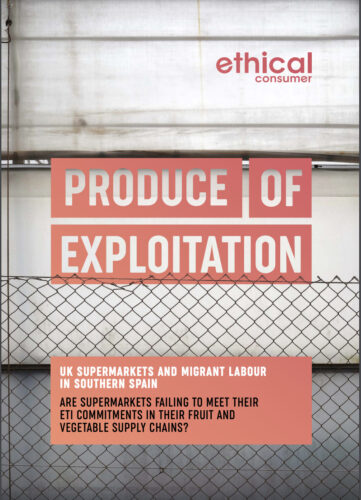- Posted in: Media
- Tags: Agriculture, Apparel, Multi-Stakeholder Initiatives, Social Auditing, Voluntary Certification
Recent months have seen a cascade of news stories with variations on the same headline: Ethical certifications fail to protect workers’ rights. From tea to wine to fisheries to produce, a few key themes emerge–and they underscore the difference between voluntary certification and key principles that underscore Worker-driven Social Responsibility.
Certification Fails to Protect Workers from Supervisors who Abuse Their Power
A BBC investigation found widespread, systemic gender-based violence on tea plantations in Kenya selling to Starbucks, Lipton, and other brands. The investigation underscored how sexual violence is too often used as a tool of control by unscrupulous managers–and how the risks of reporting are far greater for workers than the threat of punishment is for abusers.
The plantations were certified by Rainforest Alliance, despite a long track record of abuses on the plantations that were widespread enough that workers had even gone so far as to file a lawsuit over working conditions.
The reporting underscores how ill-equipped annual audits are to uncover sensitive abuses, and the threats to workers when they are forced to use corporate reporting tools controlled, in some cases, by the very management who creates their unsafe work environment.
Supermarkets Have a Responsibility for the Consequences of their Purchasing Practices 
Spain’s fields provide much of the produce consumed in UK supermarkets. Yet despite these supermarkets’ membership in the Ethical Trading Initiative and their pledges of support for basic standards of decent work, farmworkers in these supply chains face routine exploitation. A report by Ethical Consumer documents forced labor, subminimum wages, excessive work hours, sexual harassment, and other human rights abuses on Spanish farms.
The report highlights the power that companies at the top have to set conditions in their supply chains, and the dire consequences for workers when they fail to do so.
Annual Audits and Certifications Disempower and Fail to Protect Workers
The label says it’s “fair,” but conditions in South Africa’s vineyards are the opposite. That’s the conclusion reached by in-depth academic research conducted by Joshua Bell of Rhodes University. Many of the workers interviewed did not even know that they worked on fair trade-certified plantations. Those who did know what being certified was supposed to mean highlighted the ways that their realities did not live up to the program’s claims of empowerment.
“{W}hen they do audits, the employer will clean. … {P}eople are forced to clean so that if the auditor comes, they will find everything in good standard. What happens when the auditor comes is that the employer chooses who must talk to the auditor because, for example, me, I will never be called to an auditor because they know that I will tell the honest truth.”
Workers reported inadequate housing and sanitation and unsafe working conditions. They also reported widespread audit coaching and deception, including sanitary facilities that were only brought out when there was an audit. Finally, while the Fairtrade premium is one of the most promoted aspects of the program, workers reported that rather than benefitting workers, it was used as a tool of coercion and control by their employers.
Certification is Not Equipped to Implement what Marketing, Standards Promise
Workers at a Fair Trade USA and B Corp Certified factory that supplies jeans to Everlane, J Crew, and Madewell went on strike over being penalized with high paycheck deductions, as reported by Sourcing Journal. The labor unrest highlights that certification mechanisms fail to protect workers and make it clear that workers cannot rely on their dispute resolution systems to resolve issues.
While payroll deductions up to a certain amount are allowed under Vietnamese law, Fair Trade USA’s certification standards make clear that “Salary deductions are not used as a disciplinary measure.” This discrepancy between standards and law was not mentioned by workers, raising the question of whether they even know of these protections.
Factory management described the situation as a “communication problem,” promising more training. Yet this raises the question of how a factory that has been dubbed “Best in the World” by B Corp and Fair Trade Certified for years would not have this sort of basic training in place and underscores the failure of certifications to enforce standards.
There is an Over-reliance on Certifications, Which Fail to Address Root Causes of Exploitation
A recent report from the Business Human Rights Resource Center takes a systemic look at human rights in the tea sector and gives companies a failing grade. The key takeaway: There is a huge gap between corporations’ codes of conduct and professed values and the reality of implementation. One of the top recommendations: “[There is a] need to go beyond certification. Companies demonstrated an increasing awareness of the limitations of certification, but there remains an over-reliance on certification standards such as Rainforest Alliance and Fairtrade to “guarantee” protection of human rights.” These certifications are named as ineffective against growing corporate consolidation and rising use of labor contractors, both of which drive exploitation down onto workers in the tea supply chain.
Workers Suffer While Brands, Certifiers Continue to Back Discredited Certification Model
“We give our blood so they live comfortably.” That’s the title of an investigation by the Guardian newspaper into conditions on Rainforest Alliance and Fairtrade-certified tea plantations in Sri Lanka. Yet again, despite claims to fairness, workers report going hungry due to low wages and widespread wage theft, including deductions in excess of what is permitted under standards.
While the story includes shocked responses from both certifiers, reiterating their commitment to workers’ well-being and livelihoods, research commissioned by Fairtrade International in 2019 found that their certification did not improve wages or working conditions for workers. Instead, the research concludes “Overall, certification does not seem to play the role that Fairtrade’s Theory of Change has envisaged for it” regarding wages, worker power and workplace conditions. The research includes recommendations to look to the Fair Food Program and International Accord as programs that have been successful in addressing supply chain abuses.
Unfortunately, while researchers and human rights experts agree that certifications and voluntary corporate commitments are inadequate, too many companies continue to rely on this discredited approach. As this last case makes clear, workers pay a high price as corporations, and the certification industry, cling to an ineffective model that fails to protect human rights. Meanwhile, the evidence continues to build that Worker-driven Social Responsibility works to protect fundamental human rights.